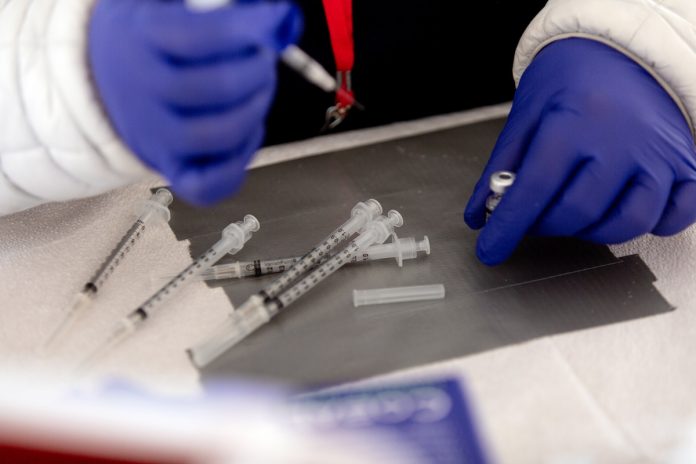SANTA CRUZ COUNTY—Santa Cruz County health officials’ prediction that residents would be frustrated over not being able to find a Covid-19 vaccine after the state expanded its eligibility to most Californians earlier this month has not come true.
Instead, the demand for the inoculation has been lukewarm in the first two weeks that all people between the ages of 16 and 49 were made eligible to receive the shot.
Only about 29% of the county’s youngest vaccine-eligible residents (ages 16-24) have received at least one shot, and about 13% are fully vaccinated, according to county spokesperson Jason Hoppin.
The good news, Hoppin said Tuesday, is that 90% of county residents 75 and above have received at least one dose, and about 74% of that population is fully vaccinated.
In all, the county has administered more than 233,000 vaccines, and about 62% of residents have received at least one dose.
Though most young people have only been eligible to receive the vaccine since April 15, Hoppin said the county still considers the initial turnout “pretty low,” and that it might interfere with the county’s progress toward herd immunity.
The faint interest in the vaccine was made evident when Wednesday’s drive-thru clinic at the Santa Cruz County Fairgrounds was opened up for walk-in appointments because about 100 doses were unclaimed. That was despite the fact that the clinic was recently added to the state-run scheduling website My Turn.
Hoppin also said that a recent vaccine clinic through the County Office of Education for students 16 years and older saw a muted response, and that there were still several appointments available for vaccine clinics through local health care providers Sutter Health and Dignity Health.
“You can choose your vaccine right now,” Hoppin said. “We were telling people early on to take whichever one is offered to you, now you have a choice.”
Why exactly the turnout for young county residents has been low is unknown, Hoppin said. He did, however, say that there have not been many incentives for young people to receive the shot. That might change this summer after California’s economy reopens in June, as Gov. Gavin Newsom announced earlier this month. Young people might be more willing to get the vaccine if sports and performance venues require it as a form of entry, Hoppin said.
Though the state is not currently requiring venues to deny entrance to those who are unvaccinated, it has given those businesses incentives for doing so. If a performance venue, for example, requires a negative Covid-19 test or vaccination for entry, then it can up its capacity to 50%, according to California Department of Public Health guidelines.
The San Francisco Giants took it a step further recently, bringing in “vaccine only” sections in which vaccinated groups of people can sit together without being split into socially distanced “pods” of two to four people.
Another incentive to receive the vaccine came Tuesday morning, as the Centers for Disease Control and Prevention updated its mask-wearing guidance. Those who have been vaccinated no longer have to wear a mask outdoors if they’re walking, running, hiking or biking, either alone or with members of their household, and in small outdoor gatherings.
“Today’s developments around masking and future developments around the tiered blueprint potentially going away on June 15, that should provide people an incentive to go get vaccinated,” Hoppin said.
Watsonville City Councilman Francisco Estrada, who is a member of the South County arm of the SAVE Lives Santa Cruz County group, said that hesitancy from the county’s younger residents does not surprise him. He said he feels that the current era of “misinformation and mistrust” fueled by conspiracy theories floating around the internet has led many in his generation (Millennials) to second guess information coming from the government.
Though they are merely anecdotal experiences, Estrada, 38, says that conversations about the vaccine with friends who live in South County have been mixed. One friend, he said, called him a “sheep” simply following the government’s orders, and another was still unconvinced that he needed the vaccine because he was young and in good physical condition.
To a small extent, Estrada said, he understands their reasoning but believes that most people will come around. One of his closest friends, for example, recently got the vaccine because he wanted to protect his young daughter.
“I think he found a greater reason than himself to get the vaccine,” Estrada said, “and for some people, that’s what it’s going to take.”
Estrada said that the South County leadership group—which consists of various local lawmakers, nonprofit organizers and health officials—was recently made aware of the low turnout among its youngest residents, and it has since started working with FoodWhat?! to further push the nonprofit’s outreach campaign targeted at the demographic.
Lupita Rojas, a Watsonville High School senior and youth activist with FoodWhat, has for the past few weeks sat in on the South County group’s weekly meetings, and had the opportunity to ask various questions about the vaccine. She has used that knowledge to produce videos about the vaccine that are geared toward her peers.
Rojas said that the project sprouted from a conversation with FoodWhat Founder and Director Doron Comerchero in which the latter was stunned that Rojas did not know simple facts about the vaccines such as when she would be eligible for it and where and how to get it.
“I remember him saying, ‘oh, that’s an issue,’” Rojas said.
Rojas has since received the vaccine, and though it was ultimately a tough decision, she said she is happy that she did. But, she said she understands that there might be hesitancy among other young people because of the false claims being posted to social media apps popular among teenagers such as Instagram and TikTok.
“You can fall down the rabbit hole (on those sites),” she said, “and I think that’s where most of us get our news.”
Rojas remembers seeing one post on Instagram that said there is a high probability that a person might contract herpes while receiving the vaccine. Another, on TikTok, claimed that there was no chance the vaccine, which took less than a year to develop, is safe, considering that there is no cure for cancer and other diseases despite decades of research.
“I don’t feel like the youth doesn’t care about getting the vaccine,” she said. “They just want to make sure they’re making the right decision for them and their family. I think some of us are still scared and trying to get the right information.”
Santa Cruz County health officials at a press conference Thursday said they are indeed trying to reach young people in various ways to assure them of the vaccine’s safety, but, Chief of Public Health Jen Herrera said, it is clear “that we may not be the messenger to provide that information.”
“This is a place where we are relying on collaboration,” said Herrera.
County Health Officer Dr. Gail Newel added that the state is working with some “youth-focused celebrities” on TikTok and other social media platforms to create vaccine outreach campaigns.
Though he is one of the youngest elected officials in the county, Estrada also said that there is a limit to the impact that his words carry. He said that most people unsure about receiving the vaccine will be convinced by the people closest to them, highlighting the South County group’s Trusted Voices campaign along with FoodWhat’s efforts. Through the Trusted Voices initiative, the group has produced videos featuring people who live and work in Watsonville that have received the vaccine and are encouraging their peers to do the same.
The most recent video featured Dr. Elisabeth Bedolla Rocha, a Watsonville High School alumna who now works at Salud Para La Gente. In the video Bedolla—speaking in Spanish—says she, her mother and her grandmother have all received the vaccine and answers several questions about its efficacy, its safety and how and where to get it.
“People watched that video and said, ‘oh, I know her,’” Estrada said. “I think that stuff makes a difference… We’re trying to be creative as possible to let people know that the vaccine is safe.”









